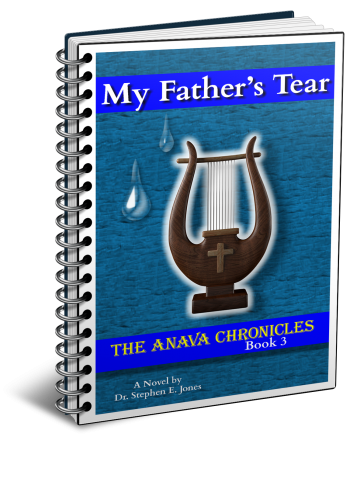Latest Posts
View the latest posts in an easy-to-read list format, with filtering options.

This is the third book in The Anava Chronicles, focusing on the main theme of Divine Provision. We go back in time to Israel during their Philistine captivity to interact with Samson and Samuel, first when the boys are five years old, and then again when they are twenty. We keep the feast of Tabernacles at Shiloh with Rephah's family and Samuel, showing the connection between the seven main speeches of Moses and the first seven miracle-signs in the book of John.
Category - Biblical Novels

The evening sacrifice in mid-afternoon was being prepared by the priests at the tabernacle, and most of the people had gone up to pray and to observe the ceremony. But Eli sat at the gate, and around him had gathered a small crowd. Within an inner circle stood Eleazar, Rebekah, and Pegasus.
As we approached the perimeter, we heard Eli speaking. “Why will you not tell us what happened? You are accused of deceiving the people by faking your death in order to make it look like you are some great one who was raised from the dead. Have you nothing to say in your defense?”
Eleazar remained silent.
“Then,” Eli said resolutely, “I adjure you by the living God to speak the whole truth about this matter!” 178
My heart sank, for I knew that Eleazar was now compelled to tell everything he knew about what had happened to him. Rebekah knew it, too, and she burst into tears.
“I went out of the tent last night to pray, for I was troubled in my spirit and had a foreboding of death coming upon me. As I prayed, I saw heaven opened, I heard a voice saying, ‘Come up hither!’ I then found myself transported to the heavens, where I was standing in the presence of Abraham. I saw also another man dressed as a High Priest, but there was a great gulf fixed between him and Abraham.” 179
“The High Priest cried out, saying, ‘Father Abraham, have mercy on me and send Eleazar that he may dip the tip of his finger in water and cool off my tongue, for I am in agony in this flame.’ But Abraham said to him, ‘Child, remember that during your life you had many advantages and opportunities to bless others according to the calling and responsibility that God gave me. On the other hand, Eleazar received grief at your hands, for you were willing to kill his father unjustly for giving you the word of God.’ Shall you not receive justice for your sin? Shall not Eleazar be recompensed for his righteousness?”
“The High Priest then answered and said, ‘Then I beg you, Father, that you send him to my father’s house, lest they also find themselves in this condition. If someone goes to them from the dead, they will believe and repent.’ But Abraham replied, “If they do not listen to Moses and the prophets, neither will they be persuaded if someone rises from the dead.’ I then awoke to see Pegasus standing over me, breathing in my face.”
“So you want us to believe that a horse raised you from the dead?” Eli said incredulously. You speak nonsense! Nothing you say is credible. You have made up this story in order to discredit me, contrary to the law which forbids speaking evil of the judges.”
Eli paused as he seemed to hit upon a cunning judgment. “Since you have testified falsely that a horse raised you from the dead, I sentence the horse to die in your place. Lead him to the door of the tabernacle, and execute him in the presence of Yahweh.”
The trial concluded, and the guards put a rope around Pegasus’ neck. They led him up the narrow path to the broad plain where the tabernacle stood on its stone foundation. Eleazar fell to his knees and wept. Rebekah fell to her knees and threw her arms around him to comfort him. Because they were both unclean by contacting a dead body, they were not allowed to go beyond the gate to the tabernacle.
Ironically, however, the sentence of the High Priest had determined that Eleazar had not truly died, and hence, from their viewpoint, neither was technically unclean. Nonetheless, their own conscience prevented them from following the crowd, and they were left mourning for their dear friend—alone, of course, except for Nathan, Samuel, Shalam, Sipporah, and me.
“I must go up to the tabernacle to see this grim miscarriage of justice,” I told the others. “Pegasus is my responsibility, and I must give an account of him.”
“Go with God,” Samuel replied. “We will remain here. I do not think any of us can bear any more tragedy for one day.”
I hurried up the path and followed the crowd to the door of the tabernacle. The priests in the outer court just then were preparing to kill the evening sacrifice as the moment of execution arrived. As I stood in the midst of the crowd of onlookers, Pegasus raised his head and looked at me, and I heard his voice speak to me over the din of the crowd: “This is my moment of glory that I foretold. Do not challenge Destiny. Grieve only in hope, for I will see you again.”
Phinehas, the younger son of the High Priest, then stepped forward with a bow, and with one swift action, shot an arrow into the heart of Pegasus. The great horse dropped to the ground, and I pushed my way forcefully through the crowd until I came to him. Cradling his head in my arms, I heard him say, “I forgive them.” 180 His head went limp in my arms, and I cried for the first time.
I sat there for a long time, unable to move or to speak. Finally, Sippore flew down and landed upon my shoulder, and I heard her voice, saying in my ear: “Thine arrows have sunk deep into me, and Thy hand has pressed down on me. I am bent over and greatly bowed down; I go mourning all day long. My heart throbs, my strength fails me; and the light of my eyes has gone from me. My enemies are vigorous and strong; and many are those who hate me wrongfully. And those who repay evil for good oppose me, because I follow what is good. Do not forsake me, O Yahweh; O my God, do not be far from me. Make haste to help me, O Yahweh, my salvation.” 181
I recognized these words from the psalm that was sung every year on the Day of Atonement. It would have been sung a few days before we arrived on the scene to prepare the way for the events of today. Sippore’s words were comforting, not in the sense that any pain was removed, but that I was reminded of the purpose of this pain. Purpose gives understanding, and understanding comforts us in the midst of pain. Sippore then sang her Song of the Night:
The night is dark, that men may rest,
Comforted by dreams, safe in their nest,
Oft peering through an open door,
Where future things and things afore
Are glimpsed with little explanation,
Leaving men with aggravation.
Yahweh’s horse broke through his bars
To find his place among the stars,
Writ in constellation bright,
Against black parchment of the night,
His story told by prophets wise
Of a champion who won the prize.
Death will not defeat the plan
To save creation’s mortal man.
Death is subject to greater laws,
That turn all hearts and mend all flaws.
Love will come to turn the tide
And all in Him will soon abide.
“I understand, little one,” I said to Sippore, when she had finished her song, “that all things will work together for good. It appears that we have one more valley of sorrow to traverse before reaching the mountain of joy. It seems to me that the cruelest thing about death is that it does not end love. Yet that is also the most wonderful thing. Though Death has been granted power over life, at least for a season, it has no power over love, from which flows all that we have and are.”
She rubbed her beak upon my cheek. “Heaven’s kiss wipes away all tears,” she whispered.
It did indeed, for I was greatly comforted.